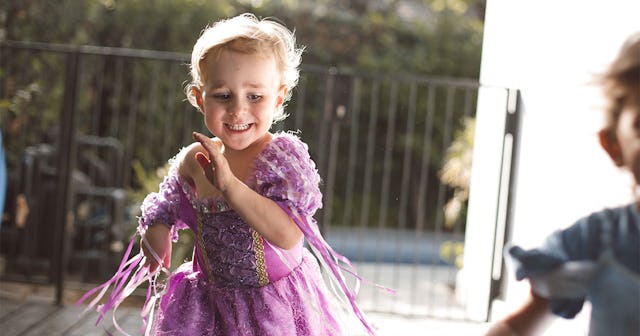Buy Your Son The Doll Or The Dress — Or Both

Remember the October 10th, 1996 “Friends” episode titled ‘The One with the Metaphorical Tunnel,” where Ross throws a fit because his toddler son Ben has a Barbie doll? Instead of embracing the fact that Ben is happy with his toy, which happens to be wearing a pink beret, he’s confused, uncomfortable, and not happy. Ross grows increasingly frustrated when his son wants nothing to do with the monster trucks, dinosaurs, and G.I. Joe doll that he offers in exchange for the Barbie. This is all done with cheap jokes based on gender and sexuality stereotypes.
Even the mild insults by the show’s characters that tease the heart of the problem can easily be deflected because they are laughed off too. “Ross, you are so pathetic. Why can’t your son just play with his doll?” Rachel asks while performing physical comedy related to another story line. Heaven forbid we let Ross or any cisgender man feel emasculated when called out on his sexism and homophobia. Instead, we need to lessen the criticism with jokes.
That episode aired 26 years ago, yet parents—mostly cisgender dads but cishet moms are to blame too—are still trying bait-and-switch techniques or blatant refusal when it comes to their sons playing with toys or wearing clothes that are “for girls.” The joke is outdated and it was never funny in the first place. Telling your son to not play with dolls, wear nail polish, wear dresses or tutus, or grow their hair is dangerous. Making fun of them when they do is abusive.
Cavan Images/Getty
Lean in close, because I want to tell you something: If you police your son’s choices based on gender stereotypes and expression, this is more of a reflection of you and not who your child is. Your child will like what they like, and be who they are, despite your demeaning words and actions. The difference will be found in how they feel about themselves and in the risks they take against themselves and others.
There is a disgusting cycle in our society that starts from the first sign of a penis on a sonogram. When parents think they’re having a boy, their brains jump to the color blue and sports teams. The boy will be adventurous, tough, and strong. The boy will play the role of protector and fighter if necessary, because boys grow up with the expectation of someday being breadwinners and men of the house. But really, the boys who grow up with rigid rules around gender stereotypes and expectations are more likely to sexually assault a girl.
Parents who don’t let their boys explore all gender roles and gender expressions are placing internalized fears and messages of shame onto their child. Denying your child’s happiness because you don’t think they “should” be playing with something that isn’t hurting anyone or anything except your ego, and Neanderthal brain is gross and selfish. And why wouldn’t you want your son to show kindness, empathy, and gentleness to a baby doll? What’s bad about a boy paying attention to and caring for a toy baby? If we want men to grow up to be attentive husbands and fathers, they need to start somewhere.
Johner Images/Getty
People (men) panic when their son wants to slip on high heels or play with Barbie dolls for a couple of reasons. They know that society makes fun of this because the accepted heteronormative narrative has convinced boys and men that girls are inferior and weaker than boys. It’s considered a bad look if a boy is aligning himself with anything that is considered girly or for girls; when something is bad or “not normal” it’s made fun of. There is a deep-seeded need to protect our children from all harassment, including gender biases, so parents discourage their boys from playing with “girl” things.
When a boy plays with a doll they aren’t seen as nurturing, creative, and kind; they are seen as weak and effeminate. Because if being a girl isn’t bad enough, then being gay is the ultimate sin. We — you — can stop these cycles.
Buy your son the doll, the tea set, the party dresses, the hair chalk, or the sparkly shoes if he asks for them. Unless he tells you otherwise, the only thing to interpret out of this is that your son likes sparkly shoes and dolls. Playing princess or serving tea will not make your child gay or indicate he is transgender. While some queers do enjoy getting fancy for brunch, one does not determine the other. And if your kid is queer or transgender? Your child is still a child who needs your unconditional love, support, and protection. Not accepting your child will only serve you and your bigotry or religion, so before you send your child down a path of rejection, depression, and self-harm, seek support so you can be the parent your child needs.
Even if your son hasn’t asked for these things, provide books and toys that allow play and dress up to be open for interpretation. Look at your and your family’s biases around gender roles — and then smash them.
Or do it your way and exchange twirling in tutus for playing with trucks or toy weapons. Not many people have died from men secure in their masculinity and ability to confidently manage their emotions and embrace gentler versions of themselves, but the “boys will be boys” narrative continues to skirt accountability and create harm.
This article was originally published on